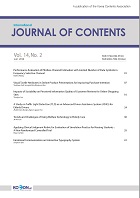- Log In/Sign Up
- P-ISSN1738-6764
- E-ISSN2093-7504
- KCI
 ISSN : 1738-6764
ISSN : 1738-6764
The Moderating Effect of Emotion Regulation on the Relationship between Neuroticism and Sleep Quality
Abstract
Personality, especially neuroticism has been found related to be related with poor sleep quality. This study focused on emotion regulation, reappraisal and suppression, which can buffer or aggravate the effect of neuroticism influencing sleep quality. One hundred and forty two ordinary adults were used in this study and were recruited and required to complete a package of questionnaires including: the Eysenck personality Questionnaire/EPQ, the Emotion Regulation Questionnaire/ERQ, and the Pittsburgh Sleep Quality Index/PSQI. The result was that participants with higher neuroticism had poorer sleep qualities than those with lower neuroticism. Moreover, participants that had high neuroticism and high reappraisal had better sleep qualities. This means that there was an interaction effect of neuroticism and reappraisal on sleep quality. However, suppression did not have a moderating effect on the relation between neuroticism and sleep quality. These findings inferred that reappraisal plays an important moderating role (buffering effect) on the relationship between neuroticism and sleep quality. Reappraisal cannot only prevent people high in neuroticism from sleep problems but can also buffer symptoms of sleep disorder by treating patient's negative emotions.
- keywords
- Neuroticism, Sleep Quality, Reappraisal, Suppression.
- Downloaded
- Viewed
- 0KCI Citations
- 0WOS Citations

